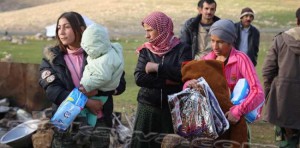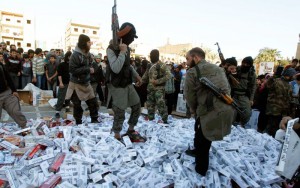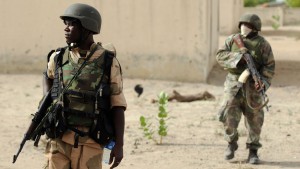DAILY MEDIA
MORNING EDITION
MONDAY 13 APRIL 2015
NATO RAPID DEPLOYABLE CORPS – ITALY – Public Affairs Office –
NATO RAPID DEPLOYABLE CORPS – ITALY – Public Affairs Office –
NATO RAPID DEPLOYABLE CORPS – ITALY – Public Affairs Office – Daily Media
Kurdistan: 15,000 displaced people from Tikrit arrives in Erbil
A significant influx of displaced people from Tikrit have arrived in Erbil, the capital of the Kurdistan Region, from where they have been subsequently settled in Soran, north of Erbil Province.
Immigration Director of Soran Abas Amir told BasNews that after liberating areas around Sinjar, Kobani and other towns and cities, many refugees and displaced people who were living in Kurdistan Region have returned home.
“However after the military operation to free Tikrit, a large number of displaced people have moved to the Kurdistan Region,” he said.
The directorate includes Soran, Mergasor, Rawanduz and Choman towns.
Since the beginning of the war against Islamic State (IS), more than 2,750 displaced families (about 15,000 people) have moved to Soran and Rawanduz predominantly.
Amir says that the number arriving from Tikrit is increasing daily.
Smokers rebel against Islamic State cigarette ban
When 34-year-old Ibrahim Hassan was caught smoking a cigarette recently, his punishment was not just eventual ill health. The extremists from the group known as the Islamic State who currently control this city have banned smoking, and Ibrahim was taken to prison for lighting up.
After 24 hours, he was brought before one of the Islamic State group’s self-appointed judges, specialists in the group’s own brand of religious law. The judge fined him 5,000 Iraqi dinars (about $4) and told him off, reminding him of religious verses from the Quran deemed to ban smoking because it can be considered a form of slow suicide.
“I paid the amount reluctantly but I felt lucky compared to other smokers who have been caught—they were flogged,” says Hassan.
When the Islamic State, or ISIS, first took control of Mosul in the middle of last year, it didn’t ban smoking immediately. But that began to change after members of the group’s “morality police” confiscated, then burned, large quantities of cigarettes, began closing coffee shops where men smoked water pipes, and started prosecuting those who smoked in public places.
From the outside it does look like Mosul is succumbing to the restrictive rule of the ISIS—but there all kinds of ways that locals circumvent the ban.
Estimates suggest that in Iraq at least 31 per cent of males smoke (the practice is less acceptable for women and the number is negligible). Mosul was a city of around two million inhabitants before ISIS took it over so one imagines that there are still, literally, hundreds of thousands of frustrated smokers here.
“You can get cigarettes easily enough if you try but it’s not a simple process,” says Abu Qays, a heavy smoker in his 30s. “They’re available in the marketplace but you have to be careful where you buy them and where you keep them, in order to avoid prison or flogging.”
Abu Qays works as a taxi driver and he says he buys, and carefully hides, about a month’s supply at a time. He has also become expert at deceiving the ISIS fighters. “I smoke when I am far from them and I always carry perfume in the car with me so I can disguise the smell,” he explains. “The dogs of the Caliph use their noses to find smokers,” he jokes.
So where are the cigarettes coming from now, seeing as the ISIS fighters did their best to destroy all the stocks in the city months earlier?
One merchant told us that they are imported from Syria and are smuggled in, hidden under legal goods like clothing and grocery items. They also come from the Kurdish region of Syria and are smuggled through Dohuk and Erbil into Mosul.
“They also come from Iraq’s central and southern provinces,” the merchant told us on condition of anonymity. “Cigarettes are hidden in tankers and oil drums. Most of what is on the market here is really bad quality and it is only meant for smuggling. The risks are high but the profits are very good.”
The traders then get the cigarettes to Mosul’s retailers—and the whole system is based on trust.
Abu Qays says that the mini-mart where he gets his cigarettes has been very successful with the illegal trade. Because the market’s competitors envied the good business, they informed on the mart’s owner to the ISIS group. The morality patrols, or hisbah, place a lot of emphasis on catching smokers. “But he’s very clever at hiding them and also at hiding the tobacco somewhere totally different and far away,” Abu Qays explains.
Pakistani and Saudis have military drills near Yemen border

Saudi and Pakistani troops started a joint military exercise near the kingdom’s border with Yemen, Saudi state news agency SPA reported on Monday, as Saudi Arabia is leading an air campaign against rebels in its southern neighbour.
Major General Fares bin Abdullah, a senior Saudi commander, told SPA that the drills were part of a series of pre-planned exercises aimed at enhancing the kingdom’s military efficiency.
“The exercise is not related to any current military operations,” he added. He did not say how long the drills will last.
Pakistan has not decided yet whether to participate in the Saudi-led military operation in Yemen.
Saudi Arabia and fellow Sunni Arab countries launched the campaign on Thursday targeting Yemen’s Shiite Houthis, who have taken over large parts of the country in recent months.
The Saudis have vowed to press ahead with the bombing until embattled Yemeni President Abd Rabu Mansour Hadi is reinstated, raising the spectre of a wider conflict with Shiite Iran, widely understood to back the Houthis.
Hadi is now staying in Saudi Arabia, which shares a border of around 1,500 kilometres with impoverished Yemen.
Saudi Arabia and other Sunni-ruled Gulf countries allied with the United States are worried that the collapse of Hadi’s government may entrench the regional influence of Iran.
Egypt border guards uncover ‘longest’ Gaza tunnel 2.8 Km
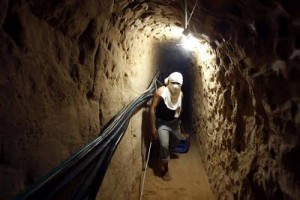
Egyptian border guards claimed to have uncovered a
2.8 km-long tunnel under the yards of three homes in Rafah near the Gaza
border.
Egyptian military sources told Ma’an that the tunnel was three meters
underground and was being used to smuggle people, ammunition, weapons and
goods.
They said it was the longest tunnel uncovered between Egypt and the Gaza
Strip since the start of operations near the border to crack down on
smuggling.
Earlier this month, the Egyptian army said it had demolished over 1,000
houses in Rafah as part of the second stage of the establishment of a buffer
zone along the border.
After a bombing killed more than 30 Egyptian soldiers in the Sinai in
October 2014, the military stepped up the campaign to build the buffer zone
amid accusations of Hamas support for the group that carried out the attack,
which Hamas has strenuously denied.
Both sides of the border are densely populated as the city of Rafah
originally extended in both directions, a growth that was the result of the
Israeli occupation of the Sinai Peninsula for more than a decade following
the 1967 war.
The North Sinai has seen prolonged violence since the ousting of Egypt’s
first democratically elected president, Muhammad Morsi, in 2013, with
Egyptian security forces battling various armed groups supporting the ousted
Muslim Brotherhood.
The border area used to be host to hundreds of tunnels which Gazans used to
import goods to get around the seven-year-old Israeli siege of the
territory.
Boko Haram fight needs foreign armies
Countries under threat from Boko Haram, the Islamist group waging an insurgency in Nigeria’s northeast, must get used to allowing foreign armies into their territory to hunt down the militants, said Denis Sassou Nguesso, president of the Republic of Congo.
“Countries need to accept that an army from another country enters its territory with a right to pursuit,” Sassou Nguesso said in a March 27 interview in the Congolese capital, Brazzaville. “These are questions we need to discuss together to establish some mechanisms.”
A six-year insurgency by Boko Haram in Nigeria’s northeast, where the group has declared a caliphate, has sucked in troops from neighboring Chad, Cameroon and Niger, which have joined an offensive to combat the militants. West African states have promised to build a military force that will rise to 9,000 troops to battle the group that’s killed at least 1,000 civilians this year, according to an estimate by New York-based Human Rights Watch.
Sassou Nguesso, 71, is among African leaders convening a regional summit in April to tackle Boko Haram. Congo doesn’t border Nigeria and its army isn’t directly involved in the campaign against the militant group.
Military Raids
Nigeria’s elections were postponed from Feb. 14 to give the army more time to subdue the militants and ensure voters’ safety. Since then, Boko Haram has lost territory, including its headquarters in Nigeria’s northeastern town of Gwoza, in a string of military raids. During the rescheduled vote that took place over the past two days, pitting President Goodluck Jonathan against former military ruler Muhammadu Buhari, suspected Islamist militants carried out several attacks, killing at least 43 people.
“You cannot think that you can achieve success in the short term,” he said. “Terrorism is a formidable weapon, it’ll probably be a long fight.”
Sasso Nguesso led the Republic of Congo from 1979 to 1992 and returned to power at the end of a civil war in 1997. He won the past two elections in which the results were disputed by the opposition. Wealth distribution is uneven in the oil-producing nation, with the World Bank estimating that half of its 4.4 million people live in poverty.
In a separate conflict in his region, Sassou Nguesso is leading international efforts to end fighting in the Central African Republic.
As with the battle in Central African Republic, African countries need international support in their fight against Boko Haram, Sassou Nguesso said.
“African countries have armies, yes, but they don’t have the economic and financial capacity to support large war efforts,” he said. “We need money.”
70 women, including 9 schoolgirls, left Germany to join Islamic State
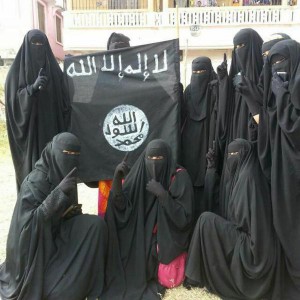
More than 70 German women, nine of whom are schoolgirls, have left their home country for Syria and Iraq to join the so-called Islamic State, the president of the German Domestic Intelligence Service (BFV) said.
According to Hans-Georg Maassen, 40 percent of those women are under the age of 25, Zeit Online reported.
While the recruitment of young girls and women by the Islamic State is not a rare phenomenon, Maassen warned that [fake] jihadists have lately focused on luring females to join the ‘caliphate’ via social networks.
The fake Jihadists blog on the internet and are active on forums, where they look for women showing an interest in jihad, BFV’s president said. Islamic State (IS, formerly ISIS/ISIL) militants then contact the girls and women to inspire them to marry jihadists.
Maassen says they write blogs with “romantic descriptions” of life in extremist camps, and the females have no idea about the future they are actually agreeing to. Most often, those who travel to be with fake jihadists are completely isolated, their passport and phones taken away.
According to Islamic scholar Marwan Abou-Taam, who works for the Rhineland-Palatinate state police in Germany, women attracted by such scenarios have psychological problems or feelings of social exclusion, Zeit Online reported. They often come from extremely poor families and have low levels of education.
Meanwhile, the expert says there are still a few young women among them with higher levels of education, adding that ISIS may consider giving them “management” roles.
Security services currently have no information on whether European women are intended to be used by the ISIS as suicide terrorists, but say they cannot exclude the possibility.
The German Domestic Intelligence Service says the overall number of those who have left the country to fight in Syria and Iraq on the side of the fake jihadists is around 650 people.
Earlier in March, German Interior Minister Thomas de Mazière said around 200 of them had returned home. Actions have already been taken against some of the returnees, while others remain under strict surveillance.
The Syrian Observatory for Human Rights earlier this month reported that ISIS has intensified the recruitment of children and teenagers this year, since facing difficulties in attracting adults into their troops. At least 400 children from Syria alone were recruited by ISIS over the past three months.
- « Previous Page
- 1
- …
- 130
- 131
- 132
- 133
- 134
- …
- 268
- Next Page »

